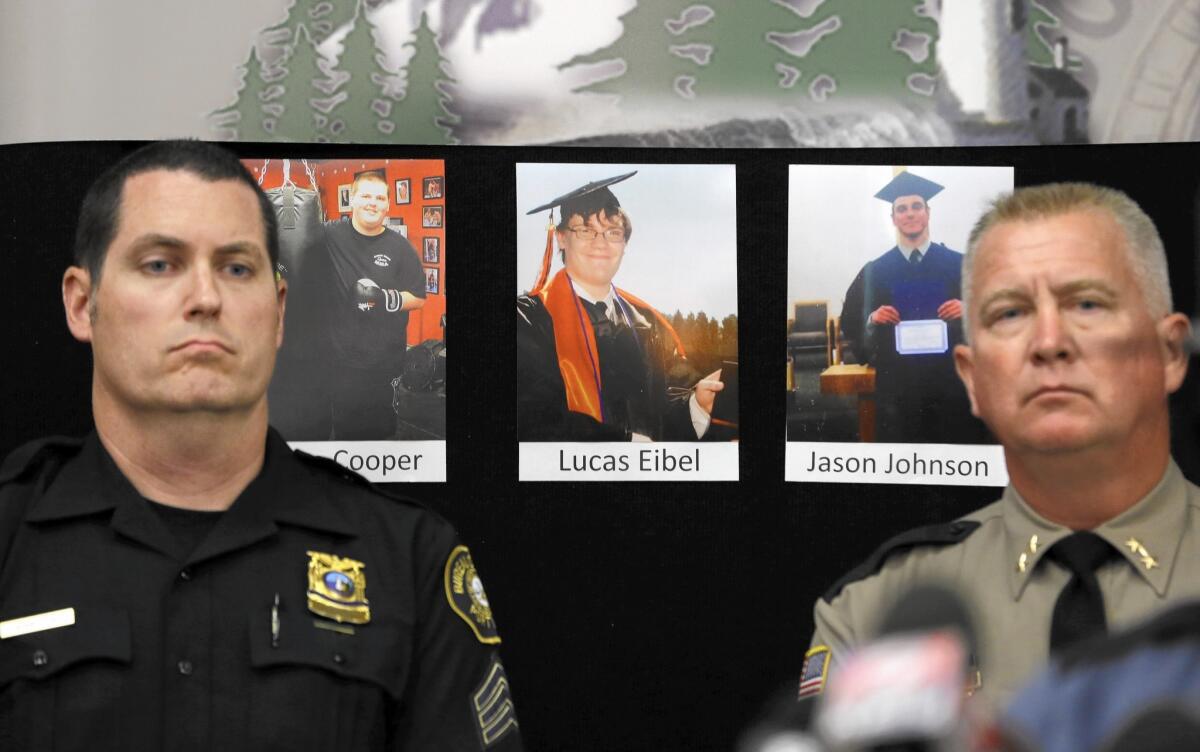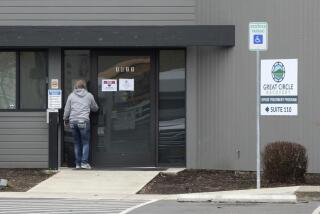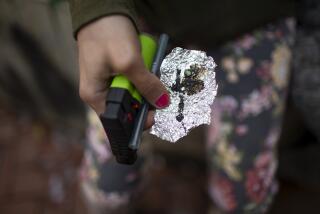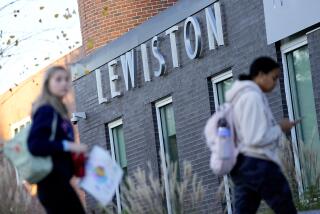Before the shooting, Oregon’s Umpqua Community College was a safe place for a fresh start

Reporting from ROSEBURG, Ore. — This was a thriving timber town when Umpqua Community College offered its first classes in the fall of 1961. The initial catalog was limited to just four courses, but they reflected ambition beyond life in the mills: General Psychology. Foundations of Physical Science. English Composition. The History of Western Civilization.
Half a century later, Roseburg and surrounding rural Douglas County are still trying to move beyond the mills, and Umpqua is still where they seek the future.
As wood products have given way to the wine industry, the school opened a wine institute.
As interest in cuisine rose, it created the River Rush Bistro as a “living laboratory.”
As retirees from California increased demand for healthcare, the school started construction on a new nursing facility.
“A lot of people get laid off — their bodies get broken in the mill,” said Heather Monroe, 36, who worked in a bakery before enrolling in nursing. “That sends a lot of people back to school. It’s given me a second chance.”
Umpqua gave many people chances before the gunman came, before the bodies fell and the president spoke and people lit candles for each other at the vigil. Before a 26-year-old student opened fire inside the school and accomplished what mass shootings have done to so many overlooked places across America: Crushed a town’s heart. Revealed a community’s depth and complexity.
Within hours, the shooting and its aftermath etched a word as unusual as Umpqua into the bloody national memory, but also added resonance to a more common term, “community college.”
Monroe got away unhurt Thursday when Chris Harper-Mercer, a transplant from Southern California who had signed up to work on the college’s fall comedy production, brought six weapons to campus and began shooting, killing nine people and wounding at least nine others.
Among the unlucky victims were a mother in her 50s who died, a young father and Army veteran who was shot multiple times and lived, a freshly minted high school graduate who loved mixed martial arts.
“This can’t be happening,” Janet Adams wrote on Twitter about her son, who graduated from Roseburg High School in June before enrolling at Umpqua. “Please God let this be a nightmare we can wake up from.”
The dead included Adams’ son Quinn Cooper, Lucas Eibel and Rebecka Carnes, all 18 years old; Lucero Alcaraz, 19; Treven Taylor Anspach, 20; Sarena Dawn Moore, 44, Kim Dietz, 59; Lawrence Levine, a 67-year-old assistant professor; and Jason Dale Johnson, 33.
At least one of the victims, Chris Mintz, rushed toward the shooter, pleading with him to stop before being struck by up to seven bullets.
“It’s my son’s birthday!” Mintz, a 30-year-old Army veteran who served in Iraq, told the shooter as he collapsed to the ground, according to an account he gave Jayme Skinner, the mother of his son.
Mintz was struck in the upper back, hip, abdomen and left hand, Skinner said, but he is in stable condition in a hospital.
Their son, Tyrik, turned 6 on Thursday. He has autism, Skinner said, and does not understand what happened.
“It’s a blessing,” Skinner said, tears welling in her eyes.
All of those killed were from Roseburg or nearby.
Ana Boylan, 18, was only in her fourth day of studies when she was shot. Doctors had to operate to remove a bullet from her spinal column, said her grandmother, Janet Willis.
“They have completed surgery and they think they got the bullet out,” Willis said. “If nothing else goes wrong, there’s a good prospect of her recovering.” Willis described her granddaughter as outgoing and bubbly.
But when she saw her on Thursday, all Willis could see was the fear and confusion on Boylan’s face.
“I know how hard it is for young people to go through something like this,” Willis said. “That concerns all parents, I think.”
Among Umpqua’s many educational missions — preparing students who want to attend four-year schools, helping adults earn high school diplomas — it also has a more basic goal: to keep people from leaving.
That explains the wine institute and the bistro and the nursing program.
The timber industry that historically has made up so much of this forested region’s identity provides only about a tenth of private-sector jobs now, down from more like 30% two decades ago when there were fewer environmental restrictions on logging. These days, young people increasingly leave town to go to college or work elsewhere.
“They have a hard time keeping young people there,” said Brian Rooney, a regional economist with the Oregon Employment Department. “But obviously it would be worse without the community college.”
The strained economy has made its mark on the school, too: Umpqua has been warned by federal officials over the high rate at which its students default on loans — up to 30% in recent years.
The school is not alone among community colleges with high loan default rates, college registrar David Farrington said.
But not all communities have a 7% unemployment rate, either.
NEWSLETTER: Get the day’s top headlines from Times Editor Davan Maharaj >>
People who leave often end up somewhere more liberal, like Eugene or Portland. When President Obama this week used the Umpqua shooting to sternly rebuke opponents of gun control measures, his criticisms were not met with uniform support here. Two years ago, John Hanlin, the sheriff of Douglas County, wrote to Vice President Joe Biden urging against any modification of the 2nd Amendment or increases in gun control.
“Politicians are attempting to exploit the deaths of innocent victims by advocating for laws that would prevent honest, law-abiding Americans from possessing certain firearms or ammunition magazines,” Hanlin wrote, quoting another Oregon sheriff.
Others here have expressed similar opposition to gun control.
“The only thing that is going to hurt is honest people,” said David Woodward, Heather Monroe’s husband. “The wrong people can always get them.”
Skinner said Mintz was a bodybuilder and was taking classes at Umpqua so he could become a personal trainer. Skinner herself works as an armed guard and opposes gun control.
“You wouldn’t remove the antlers from the antelope to stop the lion from eating it,” she said, shrugging. She thinks the Umpqua campus should be staffed with armed guards.
Umpqua has about 2,400 students who take typical undergraduate and vocational course programs, with many intending to move on to four-year colleges.
But the average age at the school is probably in the 30s, Farrington said, because a total of about 15,000 people take classes over the course of a year, the vast majority not for credit.
He noted that the closest other college is the University of Oregon in Eugene, about 70 miles north. Umpqua is much cheaper, with each credit hour costing about $90.
“Either they go with us, they commute to the University of Oregon, or they move away,” Farrington said.
Farrington, who is originally from Los Angeles, says he is often struck by the beauty of the area, where the Umpqua River flows between the Coast and Cascade ranges of mountains. About 22,000 people live in Roseburg.
“It’s like you’re hearing on television — great salmon fishing, very outdoorsy — people like to hunt and fish,” he said. “You get in your car and go one way and you’re an hour from the beach. Go the other direction and you can ski. It’s amazing to me that this place isn’t bigger.”
Yardley reported from Seattle, Gerber from Roseburg and Mai-Duc from Los Angeles.
More to Read
Sign up for Essential California
The most important California stories and recommendations in your inbox every morning.
You may occasionally receive promotional content from the Los Angeles Times.













